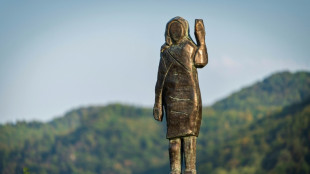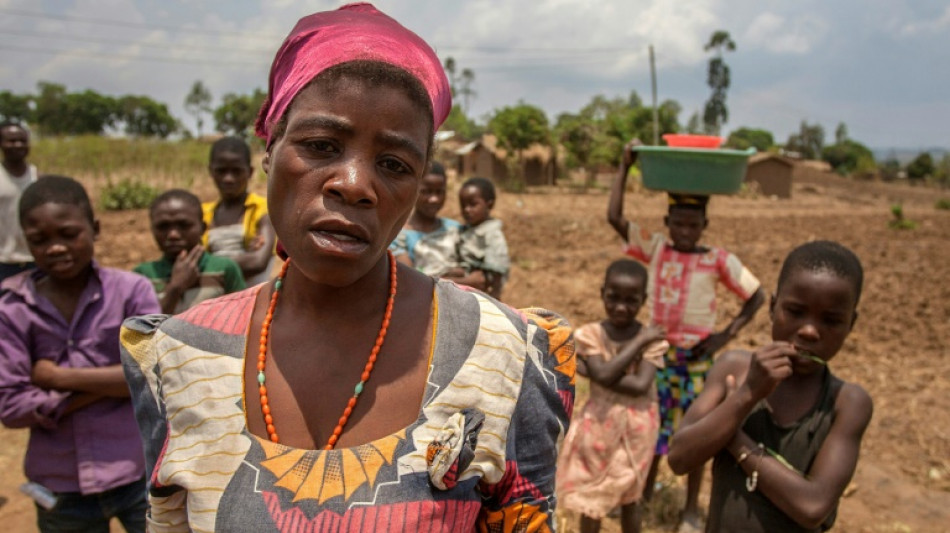
-
 Austrian opera, Finnish lust through to Eurovision final
Austrian opera, Finnish lust through to Eurovision final
-
Combs's ex Cassie faces intense defense questioning

-
 How Flick's Barca wrestled La Liga back from Real Madrid
How Flick's Barca wrestled La Liga back from Real Madrid
-
Kiwi Fox, local hero Smalley make most of late PGA calls

-
 Oil prices fall on hopes for Iran nuclear deal
Oil prices fall on hopes for Iran nuclear deal
-
European walkout after late Infantino delays FIFA Congress

-
 Eurovision: the grand final line-up
Eurovision: the grand final line-up
-
Yamal pearl seals Barcelona La Liga title triumph at Espanyol

-
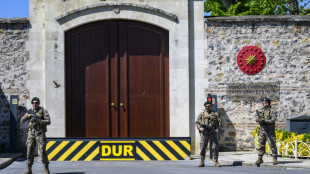 Rubio has no high expectations for Ukraine-Russia talks
Rubio has no high expectations for Ukraine-Russia talks
-
Milkshakes, opera and lust as Eurovision semi votes counted

-
 Trump admin leaves door open for tougher PFAS drinking water standards
Trump admin leaves door open for tougher PFAS drinking water standards
-
No.1 Scheffler, No.3 Schauffele blast PGA over "mud balls"

-
 Eric Trump says father's energy policies will help crypto
Eric Trump says father's energy policies will help crypto
-
US rests case in landmark Meta antitrust trial

-
 Alba inks Inter Miami extension to 2027
Alba inks Inter Miami extension to 2027
-
Real Madrid's Asencio wants 'presumption of innocence' in underage sex video case

-
 Brazil president leads final farewell to Uruguay's Mujica
Brazil president leads final farewell to Uruguay's Mujica
-
Gaza strikes kill 120 as Hamas says aid entry 'minimum requirement' for talks
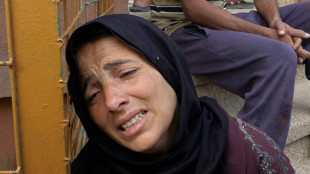
-
 Donald edges Bradley as Ryder Cup captains contend at PGA
Donald edges Bradley as Ryder Cup captains contend at PGA
-
Eurovision semi starts with milkshake and space odyssey

-
 Ruud mesmerised by 'next level' Sinner in Rome destruction
Ruud mesmerised by 'next level' Sinner in Rome destruction
-
Coinbase expects data breach to cost it up to $400 mn

-
 Eagle chip helps Gerard grabs PGA Championship lead with 66
Eagle chip helps Gerard grabs PGA Championship lead with 66
-
England great Anderson set for Lancashire return

-
 Sinner sends message by demolishing Ruud to reach Italian Open semis
Sinner sends message by demolishing Ruud to reach Italian Open semis
-
Rubio says no high expectations for Ukraine-Russia talks in Turkey
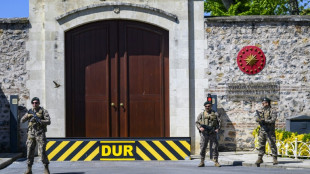
-
 NFL owners to vote on allowing players at 2028 Olympics
NFL owners to vote on allowing players at 2028 Olympics
-
Sinner demolishes Ruud to reach Italian Open semi-finals

-
 Rashford to miss final two games of Aston Villa's season
Rashford to miss final two games of Aston Villa's season
-
70 South African white rhinos to be relocated to Rwanda

-
 West Indies issue LA 2028 Olympic cricket plea
West Indies issue LA 2028 Olympic cricket plea
-
Gaza strikes kill over 100 as Hamas says aid entry 'minimum requirement' for talks
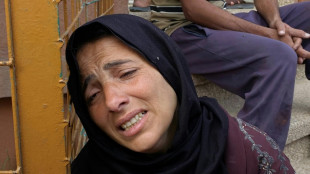
-
 Nantes striker Mohamed fined for sitting out game marking anti-homophobia campaign
Nantes striker Mohamed fined for sitting out game marking anti-homophobia campaign
-
Hamilton admits he underestimated Ferrari challenge

-
 Israel in Eurovision spotlight at second semi-final
Israel in Eurovision spotlight at second semi-final
-
England's Donald shares PGA Championship lead with 67

-
 WTA president Simon to step down in December
WTA president Simon to step down in December
-
Antonelli draws on Hamilton's heart-warming message for inspiration

-
 South African rugby mourns death of Cornal Hendricks at 37
South African rugby mourns death of Cornal Hendricks at 37
-
Cool Piastri plays down prospects of more McLaren domination

-
 Hadid sister helps launch Palestinian film streaming site
Hadid sister helps launch Palestinian film streaming site
-
Groves wins neutralised Giro sixth stage, former winner Hindley abandons

-
 Knight eager to be 'one of the girls' under new England captain Sciver-Brunt
Knight eager to be 'one of the girls' under new England captain Sciver-Brunt
-
Ukraine sends team for Russia talks, downplays expectations

-
 Paolini delights home crowd by reaching 'dream' Italian Open final
Paolini delights home crowd by reaching 'dream' Italian Open final
-
Guyana says soldiers attacked in disputed border region with Venezuela

-
 Paolini delights home crowd by reaching Italian Open final
Paolini delights home crowd by reaching Italian Open final
-
Combs's ex Cassie faces intense cross-examination

-
 US set to lose $12.5 bn in foreign tourism in 2025: industry
US set to lose $12.5 bn in foreign tourism in 2025: industry
-
Ex-Olympic swim champion Agnel to go on trial over rape allegations


Malawi's struggle with deadly witchcraft violence
The calm air cloaking Lupembe, a sleepy village on the sandy shores of Lake Malawi, conceals a dark secret.
On December 26 2019, a mob driven by rumours of sorcery hunted down and lynched a grieving family.
The killings are among dozens of witchcraft slayings that have shaken the southern African country, prompting talk of dramatic change to colonial-era laws on rumour-mongering.
"Hundreds of villagers descended on our home from all directions and started assaulting me, my brother and my parents," Walinaye Mwanguphiri, 36, told AFP.
Mwanguphiri said he made a lucky escape, but his parents and brother, as well as an aunt, were killed.
Belief in witchcraft in the southern African country is almost as widespread as its poverty -- nearly three people in four live on less than $2 a day, according to World Bank data.
Since 2019, mobs have killed at least 75 people suspected of dark magic, the Centre for Human Rights and Rehabilitation (CHRR), a non-governmental organisation based in the capital Lilongwe, says.
Only last week, local media reported that residents in Dedza, central Malawi, killed the village chief on suspicion he had used sorcery to murder his nephew.
In 2017, the United Nations was forced to pull out its staff from southern Malawi after at least seven people were killed as rumours about vampires swept the region.
- 'Recognising' magic -
Last December, a special commission tasked with drafting legal proposals to address the issue concluded that the best way around the problem was to acknowledge that magic is real.
Malawi's current laws assume that witchcraft does not exist. Under a law drafted during British colonial rule, it is a crime to accuse someone of witchcraft.
But since most Malawians believe in magic, the commission suggested it was better to recognise the existence of sorcery -- and make its practice a crime.
"People's beliefs cannot be suppressed by legislation," retired Supreme Court judge Robert Chinangwa, who headed the commission, wrote in his findings.
"The commission therefore recommends recognising the existence of witchcraft and states that the law must penalise all witchcraft practices."
CHRR director Michael Kaiyatsa says criminalising witchcraft could help prevent people from taking the law into their own hands to punish suspected sorcerers.
But securing convictions might prove tricky, he said.
"Witchcraft... is not something that you can see or prove," he said.
His group says killings caused by rumour-mongering have only rarely resulted in arrests and prosecutions.
It brands this a failure of law enforcement that has stoked a climate of impunity and fed the violence. It urges more action to bring killers to justice.
- Survivor's tale -
AFP this month visited Lupembe, which lies on a sandy shoreline of Lake Malawi near the border with Tanzania, some 550 kilometres (350 miles) north of Lilongwe.
Outwardly, the village of 700 souls showed little sign of the bloody episode of the recent past.
Men idled on a beach under the morning sun, waiting for a catch of sardines caught overnight to dry, while women washed dishes and clothes.
Inside his grass-thatched home, Mwanguphiri, the survivor, stuttered with emotion as he recounted his ordeal and how he felt to be living today among his family's killers.
The family, he said, had gathered at the village graveyard to bury his cousin's son, who had died after a short illness.
It was then that the mob descended on them.
They accused "us of killing (him) through witchcraft," he said.
Mwanguphiri said he managed to scrape his way through the crowd and ran for his life away from the village, leaving behind his elderly parents and brother, who were beaten to death.
"I survived by a whisker," he said.
The crowd destroyed his house, his brother's and that of his aunt before dispersing, he said.
Law enforcement officers rounded up a couple of villagers but later released them, he said.
The police did not respond to a request for comment.
To this day, Mwanguphiri does not know what triggered the deadly rumours.
After a year away, he returned Lupembe, where he now cares for his brother's five orphans.
"Although it is hard for us to live here after what happened, we have no other option because this is the only home that we know," he said.
"We have nowhere else to go."
L.Durand--AMWN
